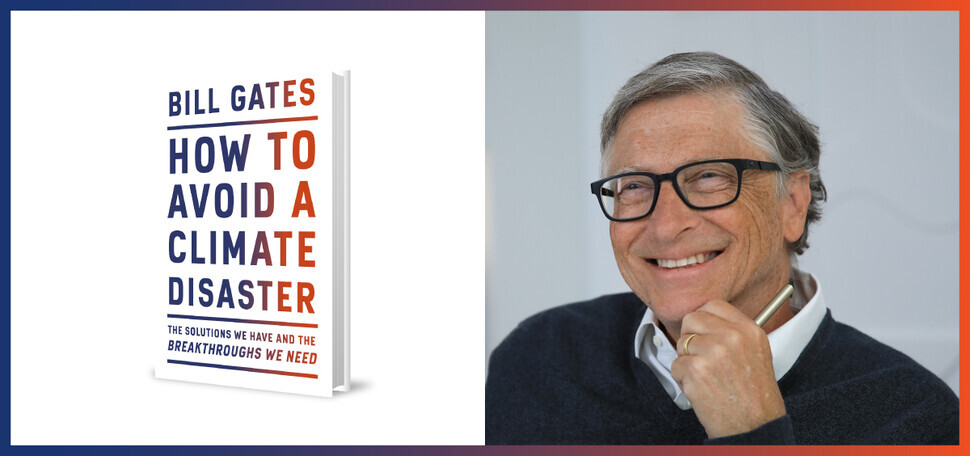hankyoreh
Links to other country sites 다른 나라 사이트 링크
[Column] Bill Gates is wrong about nuclear power

To prevent the climate crisis, we need to reorient our energy grids from fossil fuels to solar and wind power. Some argue we should also expand nuclear power, since nuclear plants don’t emit carbon dioxide.
Automobile accidents cause many fatalities, but people keep driving cars because of social inertia. But an accident at a nuclear plant would create damage on a scale that would exceed whatever benefits we derive from nuclear power.
As of 2018, cleanup from the disaster at the Fukushima nuclear plant had cost 236 trillion won (US$213.37 billion). But even that wasn’t enough to deal with the radioactive wastewater that Japan now intends to dump into the ocean. Most of that cost is being borne not by the company operating the nuclear plant but by taxpayers.
There’s not a government on earth that can deal competently with an accident at a nuclear plant. Even Japan’s meticulously designed safety net was helpless before such an accident.
But accidents aren’t the only issue. A byproduct of nuclear power is nuclear waste, which remains radioactive for tens of thousands of years.
Furthermore, the cost of generating nuclear power has gone up 26% in the past ten years. Part of that price hike results from the need to prevent previously unconsidered risks, such as the Fukushima accident. Another issue is that demand for nuclear reactors has been recently falling around the world, pushing nuclear power out of the market.
In the book “How to Avoid a Climate Disaster: The Solutions We Have and the Breakthroughs We Need,” Bill Gates argues that nuclear power is ideal for responding to climate disaster because it’s the only emissions-free source of energy that can be supplied continuously around the clock.
Renewable energy is produced intermittently, depending on the changing availability of sunlight and wind, while nuclear power is a stable source of energy, Gates observes. Therefore, nuclear should play an important role in baseload power.
In 2020, a team of researchers led by Benjamin Sovacool, a professor at the University of Sussex, published a paper in the journal Nature Energy analyzing renewable energy and nuclear energy’s impact on reducing carbon dioxide emissions. The relationship between renewable energy and nuclear power is mutually exclusive: one tends to crowd out the other.
When a government spends funds allocated for low-carbon power on nuclear energy, it has less money to invest in renewable technology. That relationship weakens the argument that nuclear and renewables need to coexist and shows that more nuclear is actually an obstacle to scaling up renewables.
Over the past ten years, the cost of solar and wind power has fallen by 89% and 70%, respectively. That’s because renewables have been the focus of technological innovation, which has entailed a huge amount of investment.
In 2020, the International Energy Agency declared that solar power was the cheapest source of electricity. In countries that have focused investment on renewables, renewable energy holds an advantage in the market even when governments reduce or totally eliminate subsidies.
Solar and wind power accounted for 72% of power capacity added around the globe in 2019. As renewables’ share of the energy mix increases, nuclear power — which is inflexible because output cannot be adjusted — has become a headache for the energy regime.
Bill Gates said that his company TerraPower has developed a cutting-edge small nuclear reactor that is supposed to be safe. But even a man who was worth US$105.6 billion in 2019 apparently can’t build a nuclear reactor without some major assistance from taxpayers. Gates sought to persuade the US Congress to provide billions of dollars in assistance over a decade to test TerraPower’s reactor design.
If nuclear power generation is the immensely profitable market that South Korea’s conservative press claims it is, why are investments from individuals and corporations insufficient for purchasing nuclear plants? Nuclear plants are only built with immense government assistance and huge infusions of taxpayers’ money.
Multinational firms such as Apple, Google and Microsoft are pushing their suppliers to provide parts that are completely made with renewable energy — which doesn’t include nuclear power.
Nuclear power may be a low-carbon source of energy, but it’s not renewable because of the nuclear waste it produces. We can’t have both nuclear power and renewable energy because they rely on different paradigms. So which one are we going to choose?

By Cho Chun-ho, professor of atmospheric sciences at Kyung Hee University
Please direct comments or questions to [english@hani.co.kr]

Editorial・opinion
![[Column] Has Korea, too, crossed the Rubicon on China? [Column] Has Korea, too, crossed the Rubicon on China?](https://flexible.img.hani.co.kr/flexible/normal/500/300/imgdb/original/2024/0419/9317135153409185.jpg) [Column] Has Korea, too, crossed the Rubicon on China?
[Column] Has Korea, too, crossed the Rubicon on China?![[Correspondent’s column] In Japan’s alliance with US, echoes of its past alliances with UK [Correspondent’s column] In Japan’s alliance with US, echoes of its past alliances with UK](https://flexible.img.hani.co.kr/flexible/normal/500/300/imgdb/original/2024/0419/2317135166563519.jpg) [Correspondent’s column] In Japan’s alliance with US, echoes of its past alliances with UK
[Correspondent’s column] In Japan’s alliance with US, echoes of its past alliances with UK- [Editorial] Does Yoon think the Korean public is wrong?
- [Editorial] As it bolsters its alliance with US, Japan must be accountable for past
- [Guest essay] Amending the Constitution is Yoon’s key to leaving office in public’s good graces
- [Editorial] 10 years on, lessons of Sewol tragedy must never be forgotten
- [Column] A death blow to Korea’s prosecutor politics
- [Correspondent’s column] The US and the end of Japanese pacifism
- [Guest essay] How Korea turned its trainee doctors into monsters
- [Guest essay] As someone who helped forge Seoul-Moscow ties, their status today troubles me
Most viewed articles
- 1[Column] The clock is ticking for Korea’s first lady
- 2Samsung barricades office as unionized workers strike for better conditions
- 3After 2 months of delayed, denied medical care, Koreans worry worst may be yet to come
- 4[Column] Has Korea, too, crossed the Rubicon on China?
- 5All eyes on Xiaomi after it pulls off EV that Apple couldn’t
- 6[Correspondent’s column] In Japan’s alliance with US, echoes of its past alliances with UK
- 7US overtakes China as Korea’s top export market, prompting trade sanction jitters
- 8Hong Se-hwa, voice for tolerance whose memoir of exile touched a chord, dies at 76
- 9[Editorial] When the choice is kids or career, Korea will never overcome birth rate woes
- 10[Photo] Smile ambassador, you’re on camera